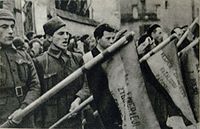- Dabrowski Battalion
-
 Flag of the unit with the famous motto For our freedom and yours and declaring allegiance to Soviet Republic of Poland, showing communist allegiance of the volunteers
Flag of the unit with the famous motto For our freedom and yours and declaring allegiance to Soviet Republic of Poland, showing communist allegiance of the volunteers
The Dabrowski Battalion, also known as Dąbrowszczacy (Polish pronunciation: [dɔmbrɔfˈʂt͡ʂat͡sɨ]) was a battalion of the International Brigades in the Spanish Civil War. It was initially formed entirely of volunteers, "chiefly composed of Polish miners recently living and working in France and Belgium".[1][2] Because of the relatively short travelling distances, these men were amongst the first to arrive in Spain. The battalion had a strong Polish flavour and even when, towards the end of the war, Poles were heavily outnumbered by Spanish troops, the officers and non-commissioned officers were still predominantly Polish.[3] It fought from 1936-1939.
It fought with great honour and took appalling casualties.
The battalion was raised in Albacete (the headquarters depot of the International Brigades) in mid-October 1937.
Contents
Formation
This battalion was originally part of XI Brigada Movil ("11th Mobile Brigade") which was formed 14–17 October 1936. The volunteers were grouped by language into four battalions to make communication easier. On 22 October 1936, the IX Brigada Movil was renamed the XI International Brigade (also known as the 13th Hans Beimler Brigade), with General "Kléber" (Manfred Stern) commanding. The four component battalions were renamed as follows:
- 1st Bn Franco-Belge became Commune de Paris Battalion.
- 2nd Bn Austro-German became Edgar André Battalion
- 3rd Bn Italo-Espanol became Garibaldi Battalion
- 4th Bn Polish-Balkan became Jaroslaw Dabrowsky Battalion, commanded by Major Tadeusz Oppman.[1]
- An entirely Spanish volunteer unit - the Asturias-Heredia Battalion - was added after the Battle of Madrid to bring the brigade up to strength.
Soldiers
About 5,000 Poles fought in that unit. The Brigade was named after the 19th century Polish general Jarosław Dąbrowski. The unit was formed as Dąbrowski's battalion in October 1936; in June 1937 it was reorganised into the 150th Brigade, which in addition to two Polish battalions (Dąbrowski's and Palefox's) included also a Hungarian (Rakosy's) and a Belgian-French (Marty's) one. In August it was renamed again to the 13th Dąbrowski's International Brigade. The brigade was demobilized in 1938 but volunteered back to service in 1939. On 9 January it crossed the French border and was finally dissolved; most of its soldiers were interned.
Most of Dąbrowszczacy were pro-Stalinist Polish communists. For their pro-Stalinist orientation they were condemned by the Second Polish Republic, which cancelled the citizenship of many of them (in spite of the fact, that Poland was second biggest arms supplier to the Republic, just after USSR). On the other hand, they were portrayed as heroes in the People's Republic of Poland; many of them served in the Berling Army, Armia Ludowa and Gwardia Ludowa during the Second World War.[1]
Siege of Madrid
Main article: Siege of MadridBy early November, the Siege of Madrid was underway and the need for men was great. The 600-man strong[4] Dabrowski Battalion, along with the rest of XI International Brigade were the first units of the International Brigades to go into action.
“ The first intervention of the International Brigades, in the siege of Madrid on 8 November 1936, would become legendary. The first Brigade to arrive was the XI with 1,700 men, mainly Germans, French, Belgians and Poles, followed by the XII four days later with another 1,550. The CNT press in the capital reported their arrival in the early hours of the morning 'in silent and damp streets: Marching firmly, their footsteps echoing on the cobblestones... singing revolutionary songs in French, German, Italian... The people ran out to cheer them,' convinced these strangely uniformed men had been sent by Russia and 'if their powerful ally Russia...intervened on their side anything was possible...the cry rang out from many a balcony--Long live the Russians !' After two days of combat half the XI were dead. ***CITATION*** ” The Dabrowski Battalion was in the thick of the action - at University City and Casa de Campo - losing two thirds of its men.[4] It was subsequently reinforced by new volunteers arriving from Albacete and by Spanish volunteers,[4] and regorganised into three Polish/Balkan companies and one Spanish company.
Battle of Jarama
Main article: Battle of JaramaThe Dabrowski Battalion, as part of the XII brigade, was sent to Jarama, a few kilometres from Madrid, to block a Nationalist attack. The Nationalist aim was to take the main Madrid to Valencia highway and thus cut Madrid off from Andalusia, where the Republican government was based. The fighting was ferocious with all five International Brigades engaged along a continuous front.[5]
At Jarama, the battalion was commanded by Jozef Strzelczyk. During the course of the battle, the Battalion lost a third of their effectives.[4] (6–27 February 1937)
Order of battle
The Dabrowski Battalion served in several brigades. As its numbers were reduced by casualties, it absorbed various other reduced international battalions, supplemented by Spanish conscript companies, but it never again reached full strength. It was demobilised in September 1938.
Date joined Date left Brigade Comment 26 Oct 1936 28 Nov 1936 XI International Brigade 11th Hans Beimler Brigade 28 Nov 1936 30 Apr 1937 XII International Brigade 12th Garibaldi Brigade 1 May 1937 4 Aug 1937 150th International Brigade 4 Aug 1937 23 Sep 1938 XIII International Brigade 13th Dabrowski Brigade Dissolved See also
Notes and references
- Polish Volunteers in the Spanish Civil War
- Spanish Wikipedia: Brigada Dabrowski
- Hugh Thomas, The Spanish Civil War
External links
- (Polish) „Dąbrowszczacy” in IPN
Categories:- Expatriate units and formations
- Military units and formations of the Spanish Civil War
- International Brigades
- Military units and formations established in 1936
- Military units and formations disestablished in 1939
- Poland–Spain relations
Wikimedia Foundation. 2010.

